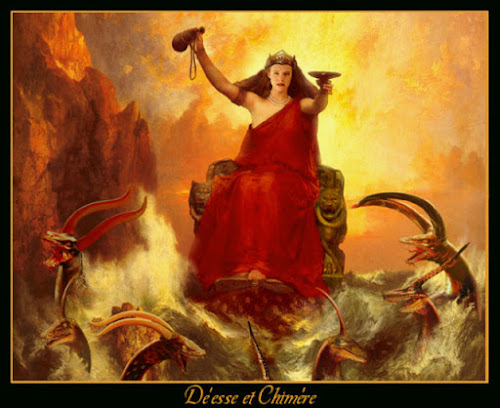It's just an uncomfortable truth that you can't help who your family is, and no
one chooses their brothers and sisters. It seems that, though they distanced
themselves from it, Gerald Gardner and Doreen Valiente as well as who knows how
many other people were trying to do something with Thelema and this became
Wicca. Aside from the adapted Crowley verses
which become The Charge of the Goddess, much of Gardner’s Book of Shadows, which is adapted
into Alex Sander’s Book, deals in the same demonology, sacred names and
elemental terms not of paganism or some ancient pre Christian British past, but
of a very Christian medieval magic. Crowley was working to turn this
Christianity over on its head, but it seems Wicca was attempting to make what
Crowley was at respectable, even placing very Christian ideas of community and
the need to suffer, the need to do good and to meditate and study in an almost
monk like way to attain magical power. This may be a reason why, though people
who practice a broad and devolved form of Wicca regard themselves as pagans, at
least Alexandrians have steered away from that term and only very recently and
very reluctantly did Maxine Sanders accept the term pagan for herself.
Before we move on I want to say
here that pagans are often eager to draw a very superficial line between pagans
and Christians while at the same time choosing to have some knowledge and
borrow some practices from every culture around the world and then barring
Christianity, Islam or Judaism, thus making those religions as special and
different as they claim to be. In this and all articles, religion is simply
religion and no specific kind is being ignored. Maxine Sanders was a raised a
devout Catholic, and met the occult through her mother who was a devout
Catholic all her life. Janet Farrar claimed to have a vision of the Virgin Mary
opening up her robe and revealing a pentagram before saying, “And now you
know.” Here, and in all articles, I will not draw the difference between
anything as simple as Christianity and paganism, but orthodox and heterodox,
exoteric and esoteric, mainstream and occult.
But the founders of the two
branches of Wicca were not the only ones working with Crowley’s material. On the other side of the
world there were Americans who were trying to work with Thelema to bring about Crowley’s Scarlet Woman.
Jack Parson’s, the rocket engineer turned occultist was inducted into Crowley’s
Thelema and along with new friend L.Ron Hubbard sought to bring about the
Scarlet Woman who would give birth to the Dark Child of the new Aeon. Even Crowley in his old age
was disgusted by their plans, and they seemed to have failed, Parson’s falling
into madness and dying early. But Hubbard kept up with Crowley’s archetypes and ideology until it
became radically transformed into what he would call Scientology. Scientology,
which has done and continues to do untold harm to its members was born in America around the same time Wicca was born in England, and it
was born from someone intentionally practicing dark arts. For someone who is
not occult it is hard to see how something so apparently dark can control and
hurt so many people for so long, but for an occultist it is hard not to see a
powerful and negative magic at work here.
Despite Aleister Crowley's
inability to escape his own lusts and megalomania which would lead to poverty
and low reputation at the end of his life, some aw the value of the system and
redeemed it. Thelema is a full functioning high magic today. In fact, as a wisdom
tradition and not a fertility cult or a brand of paganism, Thelema has ties to
Cochrane Craft and formal Wicca. The latter two are wilder and less regulated
than Thelema, but I imagine Thelema itself was wilder than the father from
which it sprang: the Hermetic Order of the Golden Dawn.
Founded by Samuel Mathers, William
Westcott and William Woodman, Golden Dawn was part of a Romantic movement reconnecting
the people of the nineteenth century to Martinism, Rosicrusianism and the other
mystery schools of the Middle Ages and early modern period. Golden Dawn
has several branches and several incarnations, but its distinguishing signs are
being alchemical, and being Christian while being deeply concerned with ancient
Egypt
and the Khemetic Gods. The rituals are a
reconstruction of Egypt,
Greek geometric rituals and Catholic ceremony. Amongst others, William
Butler Yeats was a member and so, if these people were Christian, it was their
own type of Christianity. Golden Dawn was coming into being at the same time as
Theosophy and other spiritualist movements by people who did not forsake
Christianity so much as radically (and heretically) expand its meaning. Golden
Dawn is the very opposite of pagan. It is mystic, it is occult. Members of Golden
Dawn would never regard themselves as a fertility cult, but it is from Golden
Dawn that we get most of our modern concepts of magic and spell casting
including, yes, the Tarot deck. It is the opinion of some that these people
were theoretical magicians and did not get their hands dirty with actual magic
as Crowley and
his spiritual descendants would, but if they didn’t practice magic much, it
seems they did as much as most modern pagans.
Of course, the Golden Dawn and
the groups that sprung up around it came from a fertile soil and parents just
as interesting and in our last section, we will turn to those beginning with
the movements that would arise from men meeting in British pubs in the 17th
century, Freemasonry and modern druidry.

No comments:
Post a Comment